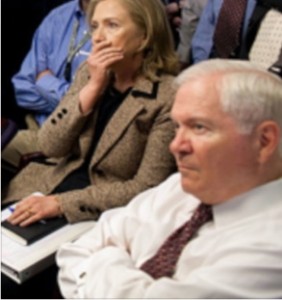
Then-Defense Secretary Robert Gates in Situation Room on May 1, 2011, monitoring the raid that killed Osama bin Laden. (From White House photo by Pete Souza)
President Barack Obama's decision to extend the U.S.-Afghan strategic relationship through 2024 was driven, in part, by one of Official Washington's most cherished myths -- that the United States abruptly abandoned Afghanistan in 1989 and must not make that mistake again.
This myth is repeated by policymakers and pundits alike. On Tuesday, for instance, MSNBC's Chris Matthews asked if his guests had seen the movie, "Charlie Wilson's War." He apparently viewed the Tom Hanks film as a documentary when it was really a fictional account, both on the innocence of the Afghan mujahedeen and the callowness of Congress in supposedly pulling the plug once the Soviet Army withdrew.
But Matthews is far from alone in believing this mythology. The New York Times' lead editorial on Wednesday criticized Obama for not explaining how he would prevent Afghanistan from imploding after the scheduled U.S. troop withdrawal in 2014, though the Times added that the plan's "longer-term commitment [of aid] sends an important message to Afghans that Washington will not abandon them as it did after the Soviets were driven out."
The abandonment myth also has been cited by senior Obama administration officials, including the current Ambassador Ryan Crocker and former Defense Secretary Robert Gates, as a way to explain the rise of the Taliban in the mid-1990s and al-Qaeda's use of Afghanistan for plotting the 9/11 attacks on the United States in 2001.
In late 2009, Defense Secretary Gates reprised the phony conventional wisdom, telling reporters: "We will not repeat the mistakes of 1989, when we abandoned the country only to see it descend into civil war and into Taliban hands."
Yet, Gates knew the real history since he was deputy national security adviser in 1989 when the key decisions were made to continue covert U.S. aid, not cut it off. Still, the fictional version from the movie, "Charlie Wilson's War," apparently proved too tempting as an excuse for an open-ended occupation of Afghanistan.
In the movie, Tom Hanks played the late Rep. Charlie Wilson, D-Texas, who was a key figure in financing the mujahedeen war against the Soviets in the 1980s. In one scene -- after the Soviet withdrawal on Feb. 15, 1989 -- Hanks begs a congressional committee for additional money but gets turned down.
The truth, however, is that the end game in Afghanistan surrounding the Soviet departure was messed up not because the United States cut the mujahedeen off but because Washington pressed for a clear-cut victory, rebuffing peaceful options.
And we know that Gates knows this reality because he recounted it in his 1996 memoir, From the Shadows.
The Real History
Here's what that history actually shows: In 1988, Soviet President Mikhail Gorbachev promised to remove Soviet troops from Afghanistan and sought a negotiated settlement. He hoped for a unity government that would include elements of Najibullah's Soviet-backed regime in Kabul and the CIA-backed Islamic fundamentalist rebels.
Gates, who was then deputy CIA director, opposed Gorbachev's plan, disbelieving that the Soviets would really depart and insisting that -- if they did -- the CIA's mujahedeen could quickly defeat Najibullah's army.
Inside the Reagan administration, Gates's judgment was opposed by State Department analysts who foresaw a drawn-out struggle. Deputy Secretary of State John Whitehead and the department's intelligence chief Morton Abramowitz warned that Najibullah's army might hold on longer than the CIA expected.
But Gates prevailed in the policy debates, pushing the CIA's faith in its mujahedeen clients and expecting a rapid Najibullah collapse if the Soviets left. In the memoir, Gates recalled briefing Secretary of State George Shultz and his senior aides on the CIA's predictions prior to Shultz flying to Moscow in February 1988.
"I told them that most [CIA] analysts did not believe Najibullah's government could last without active Soviet military support," wrote Gates.
(Note: You can view every article as one long page if you sign up as an Advocate Member, or higher).





